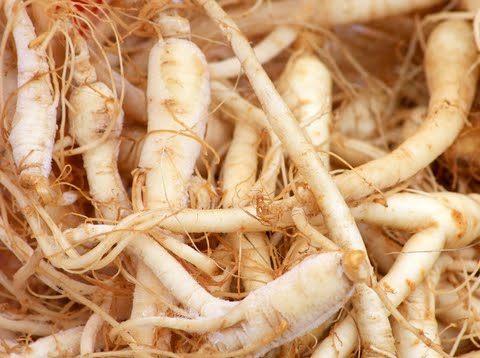Did you know there are different types of ginseng and they are all considered potent herbs for helping the body adapt to stress – both mental and physical. Ginseng is best known for its ability to stimulate your immune system and fight fatigue and stress. Several dozen studies have shown that ginseng enhances physical and mental performance, improves mood, and aids metabolic function. Other studies suggest ginseng maybe anti-inflammatory and can provide a wealth of benefits including: improved blood cholesterol; lowered liver toxicity; lowered blood sugar levels; improved blood oxygen flow; control of respiratory diseases; and enhanced stamina.
The 3 Most Well Known Types Of Ginseng
Chinese Ginseng (Panax ginseng)
Considered the “king of all herbs” in many countries, found in the forests of northeast China, Manchuria and Korea. In Traditional Chinese Medicine, Chinese ginseng is used to tonify the “Qi” (vital energy or life energy force) and is a powerful “yang” or warming tonic herb. It has been reported to: stimulate the immune system; fight fatigue, combat stress, slow aging, balance blood sugar levels, enhance mental performance and memory, lower cholesterol, and strengthen the heart muscle. It may even have anti-tumor and anticancer properties. Before rushing off to get some Chinese Ginseng be aware that it’s overuse can have some negative side effects including; irritability, insomnia and rapid heart beat.
*Panax ginseng has had a notorious reputation as a sexual rejuvenator, particularly for men, however much of this reputation seems to be over-hyped.
American Ginseng (Panax quinquefolium)
Is indigenous to eastern woodlands from Georgia to Quebec, and was used by Native Americans. The picture in this post is of American Ginseng. While not as well known as Chinese Ginseng, American Ginseng has been around for hundreds of years. Jesuit Priests were reported to be trading American Ginseng to the Chinese as early as 1718. American Ginseng has a more “yin” or cooler nature than its Chinese counterpart. While still energizing the body, American Ginseng calms the central nervous system, quiets the brain and lowers blood pressure. Also, because of its more “yin” nature, it is generally better to use on a daily, long term basis than Chinese Ginseng. However if you tend to have a cold constitution, this might not be the herb for you.
Siberian Ginseng (Eleutherococcus senticosus)
Native to Siberia, Japan, Korea and China. Although not a “true ginseng”, this variety is most highly prized. Eleuthero was traditionally used to promote longevity and general health. Many herbalists prefer Eleuthero as the ginseng for helping with women’s health issues, particularly with depression associated with PMS and menopause. Research, mostly from Russia, confirms this herb’s ability to increase mental and physical performance, stimulate the immune system, increase movement of white blood cells, promote circulation and enhance the benefits of medical radiation treatments while lessening its negative side-effects.
Cautions About Ginseng
Ginseng should be avoided by patients who are pregnant or have high blood pressure. In addition, ginseng may increase the effects of caffeine or other stimulants, which may cause sweating, insomnia, or an irregular heartbeat. It should not be used in conjunction with antipsychotic medications, steroids or hormones. As with all Chinese herbs it is best to consult with a Chinese Herbalist and see what is best for you before taking ginseng products.
Later this week I will post information about where to get Ginseng and how to take it.



Comments 3
It would be great to see some references or citations when the cautions for ginseng are listed. <br /><br />Many times, we get these messages into our heads and just keep repeating them until we're shown otherwise.<br /><br />This is certainly my process, anyway. 🙂 Hence, my desire to see your source for these statements about ginseng.
Hi Alstone – If you click on the links I included in the post you will find information on the studies I mention. I linked to information on research from the Mayo clinic as well as the studies about Ginseng's anti-inflammatory properties and the concerns about taking it when pregnant.
Yes, thanks for that tip about clicking on the links, silly me. 🙂 <br /><br />I was actually concerned with the narrative that ginseng is problematic to take while pregnant. In the link to that report I see some really weak evidence. I have yet to hear of any birth defects being traced back to the use of ginseng.<br /><br />This research takes <b><i>ONE</i></b> molecule among thousands from